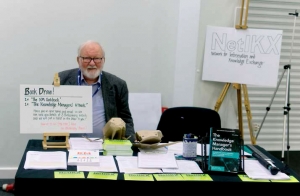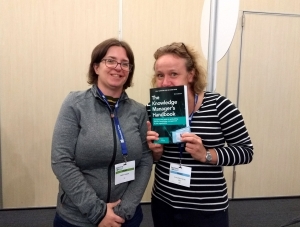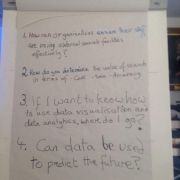Summary
Karen explained how Google is undergoing major changes in the way it analyses our searches and presents results, so that more people are using their biased, social media circles as sources of information; and an increasing amount of error-laden data is being made available free of charge. Karen delivered an insightful and informative talk about how information is being manipulated by search engines and social networks, and she challenged some commonly held assumptions that the information we obtain from search results is accurate and complete.
Tony talked about the opportunities and challenges of abstracting meaning from large datasets. Nowadays it seems as if we can collect and store as much data as we want, but how do we make sense of it and put it to actionable use? Techniques such as data mining and knowledge discovery (KDD) use machine learning and powerful statistics to help discover new insights from ever-larger datasets. Tony explained what such techniques involve and what practitioners need to know in order to use these tools in a responsible way?
Google is undergoing major changes in the way it analyses our searches and presents results; more people are using their biased, social media circles as sources of information; and an increasing amount of error-laden data is being made available free of charge. And, to make matters worse, EU regulations are now dictating what the likes of Google can and cannot display in their results.
The presentations by Karen Blakeman and Tony Hirst will discuss the implications of this in how we interpret data from search engines and how we can abstract information from ‘big data’, together with the implications for the skills and educational needs of information professionals.
Speakers
Karen Blakeman is an independent consultant providing a wide range of organisations with training, help and advice on how to search more effectively, how to use social and collaborative tools for research, and how to assess and manage information. Prior to setting up her own company Karen worked in the pharmaceutical and healthcare industry, and for the international management consultancy group Strategic Planning Associates. Her website is at www.rba.co.uk and her blog at Karen Blakeman’s Blog | News and comments on search tools and electronic resources for research (rba.co.uk)
Tony Hirst is a lecturer in the Department of Computing and Communications at the Open University, where he has authored course material on Artificial Intelligence and Robotics, Information Skills, Data Analysis and Visualisation, and a Data Storyteller with the Open Knowledge School of Data. An open data advocate and Formula One data junkie, he blogs regularly on matters relating to social network analysis, data visualisation, open education and open data policy at blog.ouseful.info.
Tony will talk about the opportunities and challenges of abstracting meaning from large datasets and discuss how we might meet the educational needs and skills requirements of ‘data-ready’ information professionals.
Time and Venue
2pm on 18th March 2015, The British Dental Association, 64 Wimpole Street, London W1G 8YS
Pre Event Information
This will be an insightful and informative talk about how information is being manipulated by search engines and social networks and will challenge some commonly held assumptions that the information we obtain from search results is accurate and complete.
Learning Objectives
• An understanding of the commercial, social and regulatory influences that have (or will) influence Google search engine results
• The ability to apply new search behaviours that will improve accuracy and relevance of search results
• An appreciation of data mining and data discovery techniques and the risks involved in using them, as well as the education and skills required for their disciplined and ethical use
Slides
Karen’s slides are available at: http://www.rba.co.uk/as/
Tweets
#netikx72
Blog
See our blog report: Seek and you will find?
Study Suggestions
None




